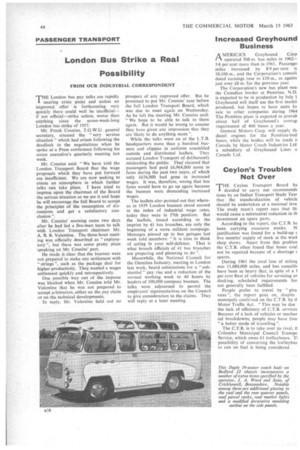London Bus Strike a Real Possibility
Page 48

If you've noticed an error in this article please click here to report it so we can fix it.
FROM OUR INDUSTRIAL CORRESPONDENT
THE London bus pay talks are rapidly L nearing crisis point and unless an improved offer is forthcoming very quickly there could well be unofficial— if not official—strike action, worse than anything since the seven-week-long London bus strike of 1957.
Mr. Frank Cousins, T.G.W.U. general secretary, stressed the "very serious situation" which had arisen following the deadlock in the negotiations when he spoke at a Press conference following his union executive's quarterly meeting last week.
Mr. Cousins said: "We have told the London Transport Board that the wage proposals which they have put forward are insufficient. We are now seeking to create an atmosphere in which further talks can take place. I have tried to impress upon the chairman of the Board the serious situation as we see it and hope he will encourage .the full Board to accept the principles of the resumption of discussions and get a satisfactory conclusion ".
Mr. Cousins' warning came two days after he had led a five-man team to talk with London Transport chairman Mr. A. B. B. Valentine. The three-hour meeting was officially described as "exploratory ", but there was some pretty plain speaking on Mr. Cousins' part.
He made it clear that the busmen were not prepared to make any settlement with "strings ", such as the package deal for higher productivity. They wanted a wages settlement quickly and retrospectively.
One possible way out of the impasse was blocked when Mr. Cousins told Mr. Valentine that he was not prepared to accept arbitration, either on the pay claim or on the technical developments.
In reply, Mr. Valentine held out no
prospect of any improved offer. But he promised to put Mr. Cousins' case before the full London Transport Board, which was due to meet again on Wednesday. As he left the meeting Mr. Cousins said: "We hope to be ablb to talk to them again. But it would be wrong to assume they have given any impression that they are likely to do anything more ".
While the talks went on at the L.T.B. headquarters more than a hundred busmen and clippies in uniform assembled outside and distributed leaflets. They accused London Transport of deliberately misleading the public. The[ claimed that passengers had paid £6,964,000 more in fares during the past two years, of which only £676,000 had gone in increased wages. It was, therefore, wrong that bus fares would have to go up again because the busmen were demanding increased wages.
The leaflets also pointed out that whereas in 1939 London busmen stood second in the index of industrial wage rates, today they were in 57th position. But the leaflets, issued according to the imprint by 41 bus branches, are only the beginning of a more militant campaign. Messages pinned up in bus garages last week told members: " It is time to think of acting in your self-defence. That is what branch officials of 41 bus branches are preparing and planning to do ".
Meanwhile, the National Council for the Omnibus Industry, meeting in London last week, heard submissions for a "substantial" pay rise and a reduction of the normal working week to 40 hours by leaders of 100,000 company busmen. The talks were adjourned to permit the employers' representatives on the Council to give consideration to the claims. They will reply at a later meeting.














































































































